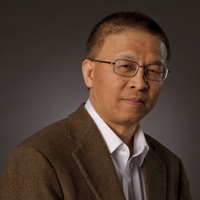
Abstract
This seminar will cover a few topics we are working on to understand and engineer solar and thermal radiation. The seminar will start with a discussion on near-field radiation heat transfer. Max Planck himself realized that the blackbody radiation law that now bears his name was limited to geometries much larger than the wavelength of thermal radiation. Theory has predicted that thermal radiation heat transfer between two surfaces separated by tens of nanometers can exceed that of Planck’s blackbody radiation law by several orders of magnitude. We demonstrated experimentally that near-field radiation heat transfer can exceed Planck’s law prediction by four orders of magnitude, mediated by surface phonon polaritons. Our experiments raise interesting questions on the convergence of radiation heat transfer mechanism and interfacial heat conduction mechanism. Theoretical approaches bridging these two regimes will be discussed. The seminar will then turn attention to solar energy applications. Our progress in fabricating thin crystalline silicon solar cells with light-trapping nanostructures will be reported, motivated by simulations suggesting that we can achieve high efficiency in such solar cells. A new design of solar thermoelectric generators (STEGs) using wavelength selective surfaces and nanostructured thermoelectric materials enabled us to achieve 4.6% solar-to-electricity energy conversion efficiency under AM1.5 condition. Ongoing work to further raise the system efficiency of STEGs will be reported. The seminar will conclude with a discussion of our recent work on solar steam generation at low optical concentrations using nanostructured materials.
Biography
Dr. Gang Chen is currently the Carl Richard Soderberg Professor of Power Engineering and head of the Department of Mechanical Engineering at Massachusetts Institute of Technology. He obtained his Ph.D. degree from UC Berkeley in 1993 working under then-Chancellor Chang-Lin Tien. He was a faculty member at Duke University (1993-1997) and the University of California at Los Angeles (1997-2001) before joining MIT in 2001. He is a recipient of the NSF Young Investigator Award, the ASME Heat Transfer Memorial Award, the R&D100 Award, and the MIT McDonald Award for Excellence in Mentoring and Advising. He is a member of the US National Academy of Engineering, a Guggenheim Fellow, an AAAS Fellow, and an ASME Fellow. He has published extensively in the area of nanoscale energy transport and conversion and nanoscale heat transfer. He is the director of the Solid-State Solar-Thermal Energy Conversion Center funded by the US DOE’s Energy Frontier Research Centers program.